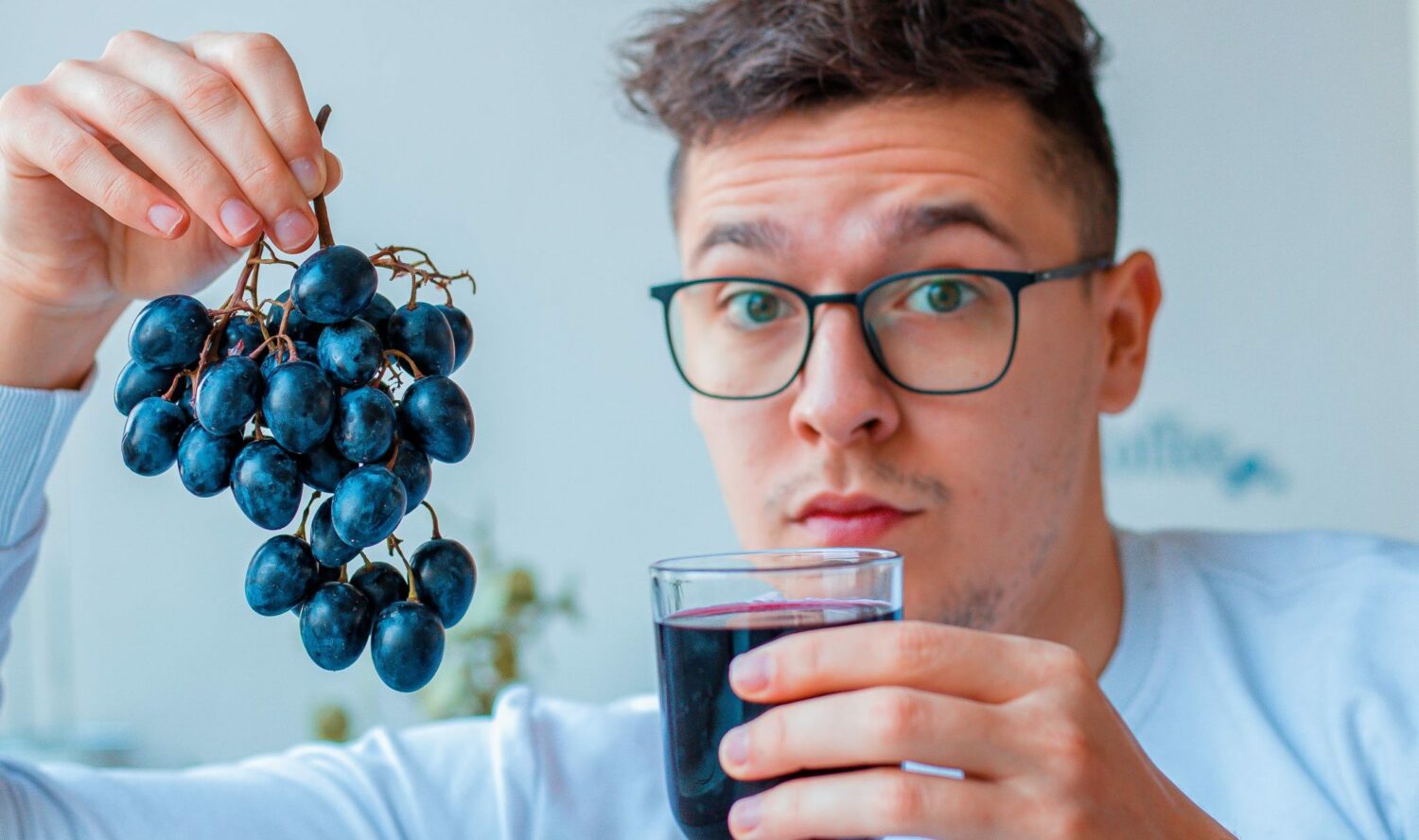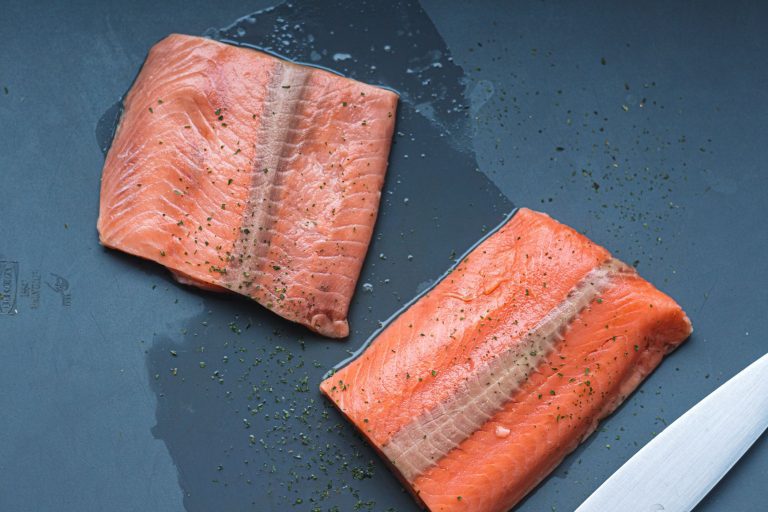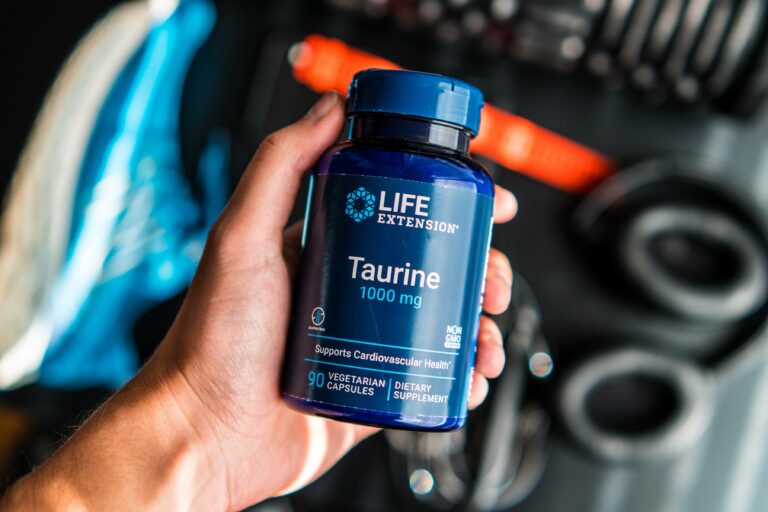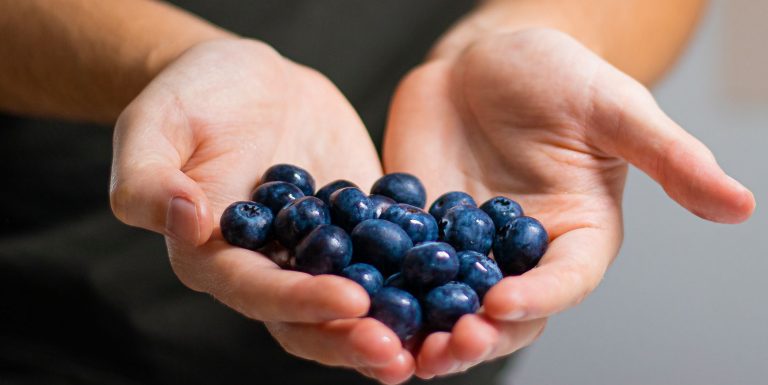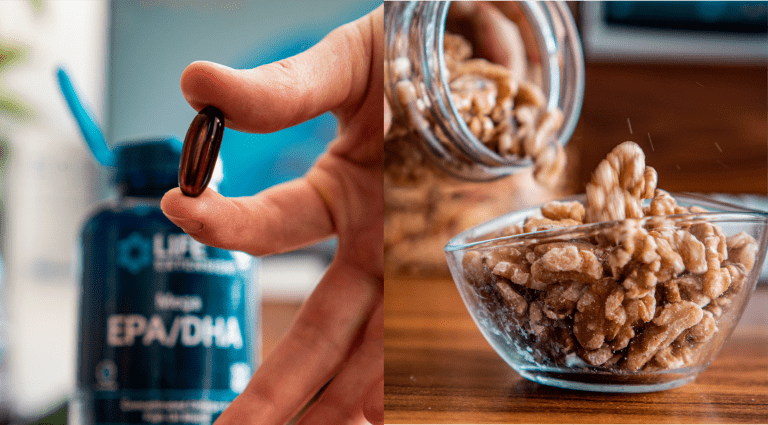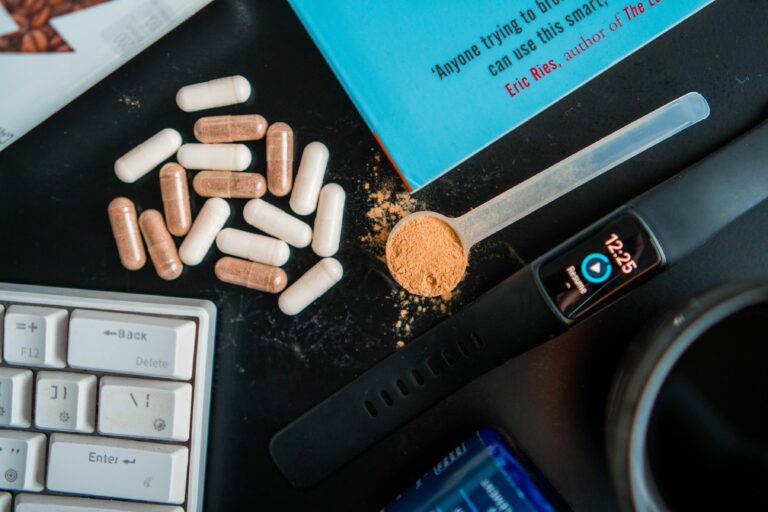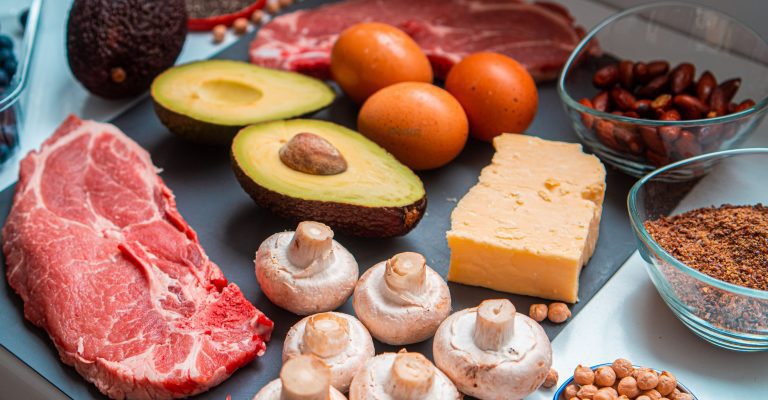11 Health Benefits Of Resveratrol: The Ultimate Longevity Tonic
Resveratrol is known as one of the most potent antioxidants found in Red Wine and grapes. It is known for its anti-aging, anti-inflammatory, brain-enhancing, and skin-regenerating properties. In this article, we’ll discuss all the potential health benefits of resveratrol, resveratrol-rich foods, best supplements, side effects, and the French paradox.
Resveratrol
Resveratrol rich foods
This miracle bioactive compound is found in foods such as grapes, red wine, cocoa, pistachios, peanuts, cranberries, and dark chocolate. It is not a coincidence that drinking Resveratrol-rich wine is one of the habits for longevity, the people in the blue zones enjoy.
Resveratrol And Anti-Aging
Resveratrol-rich wine is one of the main alcohol choices when it comes to longevity. Blue zones centenarians are known to drink up to two resveratrol-rich wine cups in a friendly environment, which is believed to significantly contribute to their health and lifespan. In the anti-aging world, astragalus and caffeine are also known for their potential to increase lifespan.
One of the reasons behind its powerful effects lies in many of the antioxidative properties it possesses. This grape polyphenol can protect the body against oxidative damage and aging.
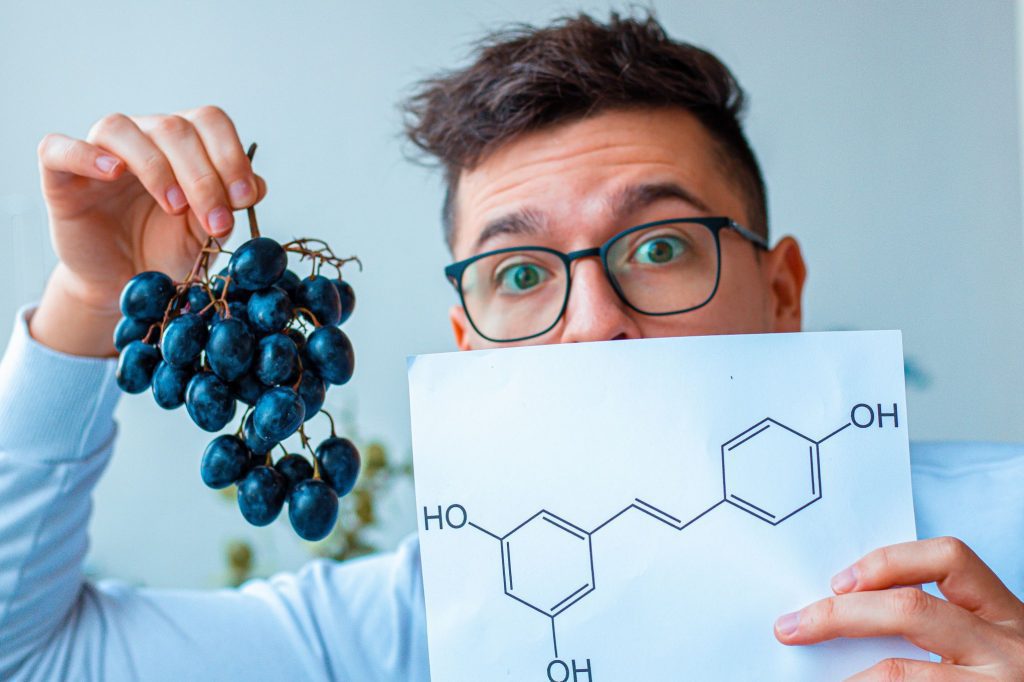
Antioxidant Powerhouse
Even though you constantly hear about wine, resveratrol is present in more than 70 plant species, but the highest amounts of it are in high-quality resveratrol-rich wine. It has been used as a supplement for many of its health-promoting effects.
Resveratrol was found to act as an anti-inflammatory agent, which may have anticancer properties. This polyphenol is also cardio-protective and vasodilatory, which means it protects the heart and relaxes the blood vessels. (1)
This plant polyphenol has also been used for its brain-enhancing effects. Many of resveratrol’s nootropic effects lie in its ability to improve blood flow in the brain and potentially exert some neuroprotective effects on the brain.
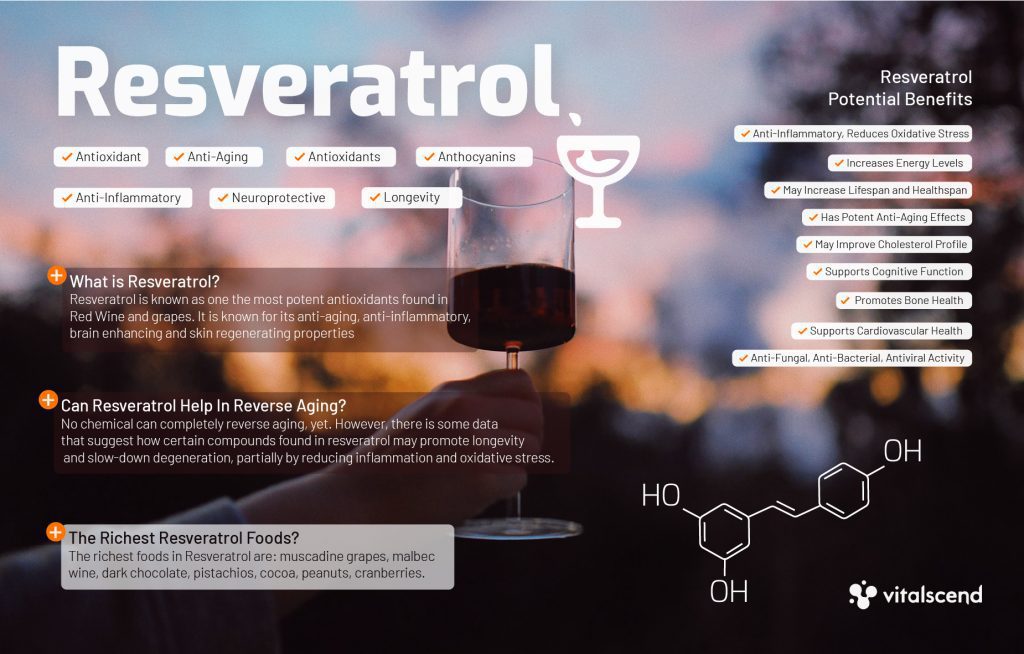
Red Wine Benefits
As mentioned above, people in the blue zones love red wine. Although there is no clear evidence on how wine may promote longevity, there is an association between increased HDL, “good cholesterol” levels, and red wine consumption, which is good for the heart.
Red wine’s also rich in polyphenols and other antioxidants which may protect blood vessel lining. However, these effects start at higher doses – mostly achieved with supplementation, not drinking wine as it will take 100+ glasses to get the same amount you’d find in potent extracts.
Fun Fact
One of the highest resveratrol-containing grapes is believed to be Muscadine grapes. Wine-wise, wines like Malbec, which comes from Malbec grapes with the thickest skin, and wines like Petite Sirah and Pinot Noir are known to be the richest sources of Resveratrol.
The French Paradox
The French paradox has become popular in the 1980s, which summarizes the inverse effect of the French diet. The French diet was high in cholesterol but Frenchmen had the lowest incidence of coronary diseases. This contradicts the previous belief of how cholesterol is correlated with higher risk factors for heart diseases.
However, the French population is eating a lot of antioxidant-rich foods that can raise HDL and not LDL. Their consumption of red wine, peanuts, and cocoa is high. These foods contain high amounts of flavonoids, polyphenols, and antioxidants, one of which is Resveratrol.
Resveratrol Benefits
1. Anti-aging and Longevity
Fasting or calorie-restriction diets are associated with increased lifespan. The longevity-promoting effect has been seen in animals, plus the risk of several diseases has been reduced.
Autophagy has been used primarily for detox purposes and for enabling the body to hit the reset button. Extended periods of fasting will enable your body to tap into autophagy and remove dysfunctional cells. It degrades and recycles proteins and protects the brain from neurodegeneration. (3)
This is where Resveratrol comes in place. There is some evidence that shows similar longevity-inducing effects of resveratrol that acts on a similar mechanism such as autophagy.
- There is a molecule named SIRT1 which has many disease-fighting properties, and turns off genes for aging, especially for age-related diseases, thus increasing lifespan. (4) Resveratrol can have an effect on the Sirtuin system and activate SIRT1 which is associated with longevity and may alter gene expression and increase lifespan. (5)
- Resveratrol was also found to improve energy utilization and insulin sensitivity, which has been suggested as a great alternative to calorie restriction for longevity-promoting uses. (6)
summary
Resveratrol can activate SIRT1 which alters gene expression associated with longevity. It can also improve cellular function and mimic the longevity-promoting effects of fasting.
2. Autophagy & Inflammation
Since inflammation is the major cause of many diseases and oxidative stress Is associated with aging, combating these two can enhance health and potentially slow down aging. Scientists refer to aging cells as cellular senescence, the higher it is, the less stress-resilient our cells become and the faster we age.
As mentioned before, autophagy is a self-preservation method in which the body can detox, reset, and regenerate. Autophagy is caused by longer fasting such as 24-48 or up to 72 hours. This can improve cell function and reduce inflammation. (7)
- Resveratrol can activate SIRT1 – which alters gene expression, suppresses senescence associated with cellular dysfunction which may promote longevity (8)
- As a potent antioxidant, it may modulate some inflammatory pathways and reduce chronic inflammation, neurodegeneration, carcinogenic or metabolic diseases. (9)
summary
Resveratrol can exert similar effects to calorie restriction related to longevity and autophagy. It can reduce chronic inflammation and oxidative damage, which cuts the risk of developing certain age-related diseases.
3. May Improve Brain Function
Resveratrol may have the potential to improve cognitive function. It is important to note that even if it doesn’t significantly improve memory, learning, and cognitive function, it can protect the brain from damage and reduce inflammation at least.
Higher dosages, especially in animal trials have been shown to improve hippocampus function, while in humans, changes were seen as improved psychomotor speed in older people.
- In 32 older adults, chronic (90 days) supplementation of 1000mg per day improved psychomotor speed without significantly affecting other domains of cognitive function. (10)
- In another study on elderly people, resveratrol improved pattern recognition memory, with no cognitive improvements or age-related changes in the hippocampus. (11)
- In postmenopausal women aged 45-85 years, 14 weeks of resveratrol consumption increased cerebrovascular responsiveness by 17% and improved cognitive task performance (12)
Administration of resveratrol for four weeks was shown to be effective for cognition in rats. The resveratrol group significantly improved cognitive ability, spatial learning, and memory. Many of these effects are believed to be due to its inhibition of the apoptosis pathway. (13)
summary
As a polyphenol, resveratrol may improve cognition and reduce neural inflammation, but only at higher doses.
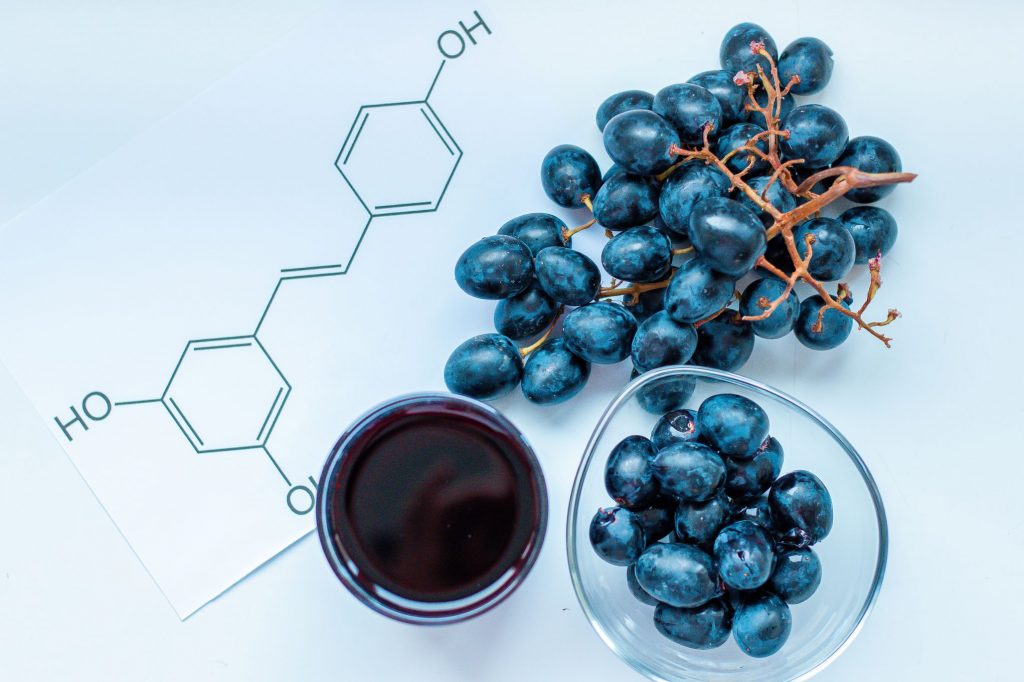
4. Potential Neuroprotection
Many neurodegenerative diseases originate from brain inflammation, so antioxidants could have the potential to confront this.
Resveratrol has been shown to:
- reduce inflammation through inhibition of pro-inflammatory enzyme activity, affect synaptic plasticity and improve cerebral flow. (14)
- exert neuroprotective properties and attenuate cognitive impairment in mice. (15)
- influence glial changes and potentially support brain protection by increasing glutamate uptake and removing excess glutamate. (16)
Due to its ability to influence glutamate uptake, regulate inflammation, and improve cerebral blood flow, resveratrol may be a potential agent for delaying neurodegenerative diseases. It may also reduce plaque build-up.
Resveratrol was shown to reduce amyloid plaque in the brain of transgenic mice with Alzheimer’s disease. Administration of resveratrol reduced glutathione levels by 21% and increased brain cysteine levels by 54%, which may be linked to decreased plaque formation. Cysteine is used to produce glutathione which is the brain’s main antioxidant. (17)
summary
Through reducing inflammation, reducing plaque build-up in the brain, and modulating glutamate uptake, resveratrol may be the potential agent that can slow down age-related cognitive decline.
5. Protects Cartilage, May Prevent Joint Pain
Resveratrol was shown to interact with vitamin D to promote bone health. This bioactive compound has also shown activities in osteoblastic cells. The study suggests potential uses of supplement that uses a combination of resveratrol, inositol, vitamin K, and vitamin D in perimenopausal and postmenopausal women. (18)
Another reason it can be good for the bones is the reduction of inflammation. Resveratrol was shown to inhibit mitochondria degradation and chondrocyte apoptosis induced by interleukin-1 beta. (19)
A combination of resveratrol and curcumin showed synergistic effects in protecting the cartilage. This combination inhibited inflammatory markers and pathways involved in bone degradation. The main mechanism behind it is suppressing NF-kappaB-regulated gene products involved in inflammation. (20)
In the connective tissue, stem cells can differentiate into:
- bone-building osteoblast
- cartilage-building chondrocytes
- fat-building adipocytes
- muscle building myocytes
It was shown that resveratrol can stimulate SIRT1 which accelerates fat-burning, plus it blocks PPAR gamma which functions to store fat. Resveratrol and isonicotinamide promoted osteoblast (bone-building) differentiation. (21)
summary
Resveratrol can improve bone health and ease joint pain due to its anti-inflammatory effects on the bone. It may also promote bone-building and enhance bone mineral density, working with vitamins D and K.
6. Anti-Activity
Research has shown that resveratrol has the potential to act as:
- Antioxidant
- Antifungal
- Antiviral
- Antibacterial
- Anticancer
- Anti-inflammatory
This polyphenol can be used to fight oxidative damage due to its radical scavenging effect. Resveratrol is one of the major antioxidant-like bioactive compounds In red wine. (30)
Extra Research: Resveratrol 6-Anti Activities
- Plants produce trans-Resveratrol (1a) in response to pathogen infections. Resveratrol can have a positive effect against these infections, especially in fighting Candida species, which suggests it has potential antifungal activity. (31)
- Besides many of its antioxidant and cardioprotective properties, resveratrol can potentially exert antibacterial activity against foodborne pathogens. (32)
- Resveratrol may be a potential anti-cancer or chemo-preventive agent through its effect on a variety of pathways such as modulation of cell metabolism, tyrosine kinase receptor activity, cell proliferation, and formation of multi-protein complexes. (33) (34)
- Resveratrol’s antiviral effect mostly relies on its ability to inhibit viral replication and modulate protein and nucleic acid synthesis and gene expression. Tested against human and animal viruses, resveratrol shows high antiviral potential through the inhibition of various signaling pathways. (35)
summary
Resveratrol was shown to modulate various pathways associated with its anti-inflammatory, anti-viral, anti-fungal, and anti-cancer properties and may be a potential agent in treating or preventing diseases related to inflammation.
7. Supports Cardiovascular Health
Red Wine is known to be rich in resveratrol but there are three important questions
- Is red wine healthy for the heart?
- Is Resveratrol the key ingredient in the wine with cardioprotective properties
- How much wine do you need to drink for these effects
There are multiple mechanisms involved in predicting heart health. However, until now, stabilizing blood sugar levels, lowering blood pressure and LDL, increasing HDL, and reducing inflammation are some of the most common factors that can positively affect heart health. For some of which, resveratrol has been shown effective at higher doses.
Potential Cardio Protection
Resveratrol is a known substance present in red wine that has many anti-inflammatory and cardioprotective properties. (22)
There are many ways this polyphenol can improve heart health, however, there are many other factors such as diet, genetics, and activity level that are important to take into consideration. (23)
In this study, resveratrol was shown to reduce the incidence of ventricular tachycardia and fibrillation (induced in rats). Resveratrol also increased Nitric Oxide (NO) levels which can improve blood flow and decrease lactate dehydrogenase levels. So, by modulating inflammation and NO levels, it has shown cardioprotective effects. (24)
May Improve Cholesterol & Lipid Profile
This review took a look at ten randomized trials on 363 patients in total. Blood lipid levels were altered by Resveratrol in patients with type 2 diabetes. It was effective in improving triglyceride levels, but in patients with obesity, it increased total cholesterol. (25)
In hyperlipidemic mice, administration of resveratrol was associated with a reduction of total cholesterol, triglyceride levels, and LDL or low-density lipoprotein cholesterol, which shows its beneficial effects on blood lipid levels. (26)
In another study on mice, there was a reduction in LDL and inflammation markers (IL-6). Since it reduced atherosclerosis development, it can be a potential anti-atherosclerotic agent. (27)
Blood Pressure Lowering Effect
Resveratrol can improve blood vessel dilatation by increasing nitric synthase, an enzyme involved in nitric oxide production. Nitric oxide (NO) has vasodilatory effects and can improve blood flow, therefore lowering blood pressure. (28)
Along with improving blood flow, there is a reduced risk of plaque build-up and coronary disease, which also enhances your body’s oxygen supply and nutrient transport. In people with hypertension or hypercholesterolemia or smokers, there are reduced levels of the eNOS enzyme, Nitric Oxide synthase. (29)
summary
Resveratrol is one of the main red wine components which can have heart-friendly benefits. By reducing inflammation, plaque buildup, LDL cholesterol, and increasing HDL and Nitric oxide, Resveratrol can improve cardiovascular health.
Potential Resveratrol Effects
There are many other potential effects of Resveratrol for whom evidence is lacking. It is either in animal studies or high dosages, but it is worth mentioning and looking into:
8. Sexual Enhancement
In postmenopausal and obese women, 1 gram of Resveratrol daily for 12 weeks increased SHBG, the sex steroid hormone-binding globulin, without affecting estrogen or testosterone significantly. This protein is made by the liver and it transports sex hormones, which can improve libido. (36)
In men treated with PDE5i against erectile dysfunction, combination of L-citrulline (800mg/day) and TransResveratrol (300mg/day) supplementation improved erectile function. (37) Resveratrol has also been shown promising in increasing testosterone in mouse Leydig cells via modulation of LH-receptor and cross-talk effect between estrogen and androgen receptors. (38)
9. Insulin Sensitivity
- AMPK can help control blood sugar levels due to its role in glucose metabolism. Remember that SIRT1 we mentioned above? SIRT1 can activate AMPK, thus stabilizing blood sugar levels.
- Resveratrol treatment in mice increased mitochondrial biogenesis, NAD+ levels in skeletal muscle, and activated AMPK. (39)
- At 1 gram twice daily in obese men for 30 days has altered glucose metabolism and shown positive changes in improving insulin resistance and glucose homeostasis in the small Caucasian group. (40)
It is believed that some of the insulin sensitivity improvement is due to improving endothelial vasodilatory function and blood perfusion in skeletal muscle, which can also improve glucose transport and utilization. (41)
10. Gut Microbiome
This polyphenol was shown to exert some anti-obesity effects in mice fed with diets high in fat. In fact, resveratrol was shown to alter microbiota composition and enrich the gut with healthy bacteria. Transplantation of Resveratrol enriched microbiota helped mice to increase insulin sensitivity, reduce inflammation, modulate lipid metabolism, and lose weight. (42)
In the mice model, 200 mg/kg a day reduced visceral fat and reduced lipid levels and blood glucose in mice fed with high-fat diets. Resveratrol was also efficient in balancing the good vs bad bacteria in the gut, increasing both Lactobacillus and Bifidobacterium while decreasing the growth of Enterococcus faecalis. (43)
11. Muscle Preservation
There is a study that investigated the effects of Resveratrol on sustaining muscle mass in longer microgravity, like a trip to Mars. They found out that Resveratrol can preserve muscle function and mitigate muscle atrophy at dosages of 150 mg/kg/daily. (44)
After muscle atrophy or longer duration muscle disuse, and even aging, resveratrol may have the potential to improve muscle function. It enhanced muscle regeneration and induced changes in both type IIA and IIB muscle fibers in aging rats. (45)
summary
Resveratrol may have potential effects on improving gut microbiome health, preserving muscle mass, and enhancing libido, and insulin sensitivity. However, these effects should be taken with caution and are probably over-exaggerated
Research Limitations
*Studies have some limitations, important to evaluate the validity of their results. Here’s a highlight of some and NOT ALL studies (and limitation), shown in this article, for context.
- In vivo, In-vitro research on animals, cells, organisms * transgenic mice with Alzheimer’s, C. elegans, Sprague-Dawley rats, C6 glioma cells
- Further research needed to explain stimulus-specific autophagy effects and resveratrol and Sirtuin system relationship.
- Little clinical evidence for Resveratrol’s effectiveness for therapeutic purposes.
- Aged data or data older than 10 years *2011, 2009, 2006, 2000, etc.
- Data of some studies includes questionnaire results *subjective values.
Resveratrol Uses, Side effects, Precaution, Drug Interaction, And Dosage
Resveratrol has many potential benefits for human health. It is the polyphenol found in peanuts, grapes, and red wine that has potent antioxidant properties.
Resveratrol has been for many of its health-promoting benefits. It is a well-studied supplement, however, all of these effects are just potential effects that might improve and support health.
Supplement Disclaimer: The content on this Site is for informational purposes only, and it is NOT intended to give or replace medical advice. Make sure you consult your physician, doctor, or health professional before using any supplement, for its dosage, uses, precautions, and interactions.
Uses
Precautions
Drug Interaction
Dosage
Only strong evidence support for resveratrol usage and its effectiveness has been done on Hay Fever. Resveratrol spray can reduce allergy symptoms in adults with seasonal allergies.
Resveratrol has also been used for: (46)
- Lowering cholesterol
- Improving liver function
- Improving insulin sensitivity
- Improving Brain Function
- Acne treatment
- Diabetes management
- Diabetic neuropathy
- Metabolic syndrome
- Rheumatoid arthritis
- Anti-aging
- Inflammatory bowel disease
- Osteoarthritis
- Chronic obstructive
- Pulmonary disease
- Atherosclerosis
Since resveratrol has a similar structure to synthetic estrogen, studies have found that it may act as a phytoestrogen and function as an estrogen agonist. So, people with hormonal imbalances, and hormone-sensitive conditions, especially breast cancer, must consult a doctor before supplementing with it. (47)
- Pregnant, and breastfeeding women and children should consult with a doctor before using the supplement. As in food form, red wine shouldn’t be consumed as the primary source of resveratrol for these two groups, due to the detrimental effects of alcohol consumption. Better natural sources would be dark chocolate, blueberries, cranberries, pistachios, peanuts, and cocoa.
- People who will undertake surgery should avoid resveratrol at least up to 2-3 weeks before it since it can increase the risk of bleeding.
- Those who take immune suppressants or blood pressure medications should also be cautious because resveratrol may interfere with the removal of certain compounds which means they can build up at higher, toxic levels in the body. (48)
- Major adverse side effects of Resveratrol supplementation were not found. Lower dosages of Resveratrol are well tolerated by many and long-term side effects are not known.
Resveratrol should be avoided in combinations with: (49)
- Anticoagulant drugs, can increase the risk of bleeding and slow down blood clotting.
- Medications changed by the liver, affects the speed of breaking down these medications
- Resveratrol dosage depends on many factors. There have been different uses of resveratrol at different dosages.
- Short-term uses of Resveratrol are well tolerated by healthy people, long term side effects have not been yet investigated and proven.
- Usually Resveratrol supplements on the market range from 100 mg up to 2000 mg (2g). There is also the option of taking smaller dosages divided all throughout the day.
- Doses ranging from 2,000-6,000 mg/day may produce side effects such as stomach upset & discomfort and abdominal cramps in some people.
- In general, before trying out any supplement, you should speak to a doctor first, and resveratrol is no exception.
Frequently Asked Questions
What Is resveratrol?
Resveratrol is a powerful antioxidant that can be found in grapes, wine, chocolate, pistachios, peanuts and cocoa. It is one of the most popular longevity-promoting supplements on the market.
What are the benefits of resveratrol?
The potential benefits of supplementing with Resveratrol include:
– Anti-inflammatory, may reduce oxidative stress
– May increase lifespan and health span
– Has potential anti-aging effects
– Supports cognitive function
– May exert neuroprotective effects
– Promotes bone health
– Supports cardiovascular health
– Potential Anti-fungal, antibacterial, antiviral activity
– May improve digestion and gut health
– May enhance sexual function & blood flow
Will taking resveratrol increase lifespan and affect longevity?
Resveratrol has been shown to act in a similar way to autophagy and intermittent fasting, in terms of anti-aging. It can affect (activate) SIRT1, an important molecule associated with longevity and gene expression. This can theoretically improve cellular function, thus potentially mimicking the longevity effects of fasting. Resveratrol can also reduce inflammation and oxidative stress, which is the major cause of many degenerative diseases.
Can resveratrol help in reverse aging?
No chemical can completely reverse aging, yet. However, there is some data that suggest how certain compounds found in resveratrol may promote longevity and slow-down degeneration, partially by reducing inflammation and oxidative stress.
What is recommended resveratrol dosage?
There is no recommended dosage of resveratrol. It has been used as a supplement from 100mg up to 6000 mg a day. Regular doses range from 100-2000mg, but anything over 1000mg may cause side effects like stomach upset, discomfort and abdominal cramps. Consult with your doctor first, before taking any supplement.
Which foods have the most resveratrol?
The richest foods in Resveratrol are: muscadine grapes, malbec wine, dark chocolate, pistachios, cocoa, peanuts, cranberries.

